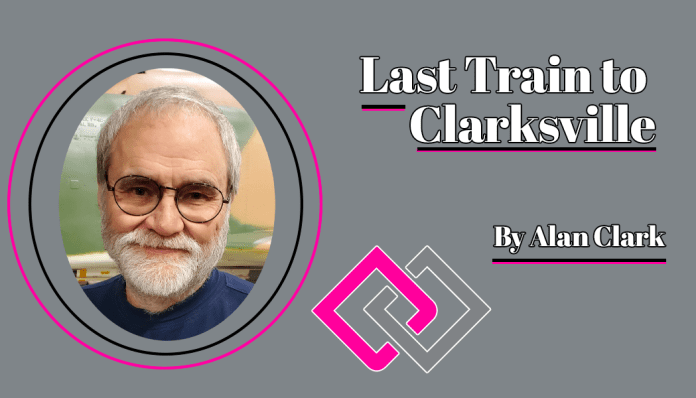Today, our last train to Clarksville is stopping at a new station. Today’s stop takes us to the station of – Who Are we. We will stop at this station from time to time. Fasten up – here we go!
I’ve often compared childhood to a Cape Canaveral rocket launch. Our parent’s cooked up and bequeathed to us a unique DNA cocktail (forming our personality) followed by 18 years of parental molding and guidance, all in the hopes that one day our little space capsule might land safely on the moon, metaphorically speaking, of course. But what happens if on our way to the moon we decide that Mars is a better fit for us?
Inertia is a hard thing to alter. Left to its own devices, our spacecraft will follow its pre-programmed course. If an outside force does not intervene, we will land on the moon as scripted by our parents and society, in general. However, internal forces can also alter our pre-determined flight plan. We have mechanisms and controls available to us, from within our ship, to alter our original trajectory, the one ‘society’ preordained for us.
So, what does our moon represent? It symbolizes the path most often taken by most people. If we end up landing on the moon, we will find billions of folks already living there. I say this because the moon also represents the status quo, the road most heavily traveled. It represents conventional values and the ‘normal’ way of doing things. Our parents believed it represented safety and security. And they believed this because society told them that this particular flight path would present us with the least amount of resistance. Our parents’ motives, in other words, were noble. It worked for them, and they thought it would work for us also. They thought they were doing us a favor by pointing us towards the moon. After all, like I said, there are already billions of successful people living there.
For those who land on the moon, they will discover that schools, hospitals, highways and all sorts of other structures and infrastructures are awaiting their arrival. Suburban neighborhoods with manicured lawns and PTA organizations, will greet them with open arms, as long as no moonian principles are violated. The pressure to fit in provides the necessary gravity to keep its occupants moored to the moon’s surface. These social morays more than make up for the moon’s lack of actual gravity.
But as your little vessel heads towards the moon, let’s say you discover a small library on board your spacecraft. And within this library are thousands of books about life on the moon. But after reading a few of these books, you realize you may not want to live there (or even belong there) with the rest of the herd? Instead, you find more in common with a small group of explorers living on Mars.
But there aren’t many books on Mars as a habitat, and the few which are available are harder to understand. They are full of paradoxical and confusing teachings, and they do not guarantee safe passage (like that of a moon shot). Nevertheless, you look around inside your capsule and find the necessary levers and knobs to alter your flight-plan. You push and pull them accordingly and then lean back and wait.
What will a Mars landing feel like, you think to yourself? And will you find others living meaningful lives there, amidst the low-level glow of this Angry Red Planet? The books you read on Martian life, during your initial voyage to the Moon, are more abstract and less directive than Moon books so part of you is unsure what you may encounter.
Finding our unique path in life is no easy undertaking. Some may never find it, others might come close but still miss. It’s also possible to switch paths once or many times. In general, discovering who we are and where we belong (path wise) is a lifelong struggle. We both want to fit in yet stand out. Joseph Campbell, professor of literature at Sarah Lawrence College who worked in comparative mythology and comparative religion, tells his readers to follow their bliss.
Our bliss is that joyful spot in our hearts which becomes activated whenever we do something we enjoy. For example, I enjoy writing and telling stories. So, I pursued a vocation that preimmunized both activities. If we can get paid for doing what we enjoy, then it’s like winning the lottery of contentment.
I’m a child of the 60’s. I graduated from high school in 1969, the year of Woodstock. I went to Vietnam in 1970. Vietnam shook my world to its foundation. And it was during the smog of war that I adjusted my flight plan to include the road less traveled, a road that my parents did not place me on.
Going forward, I plan on posting some essays which highlight this less traveled road. M. Scott Peck in his highly successful book, ‘The Road Less Traveled’, started off by noting, “life is difficult.” The desire to fit in with a group of people is a universal human need. It can be a big group or a small one but very few of us can make it through this life without a little help from our friends because as Scott pointed out – life can be very hard, at times.
Questions – has your life’s flight plan taken you down different paths? Were they of your own choosing? Are you content with your current location and future trajectory? If not, can you trim your wings and fly off in a different direction? These are just a few thoughts to ponder.
Postscript – this essay tests the waters for possible future posts of this nature. If it doesn’t create much readership traffic then I will adjust my course, accordingly.






